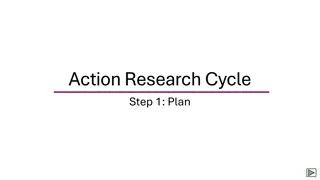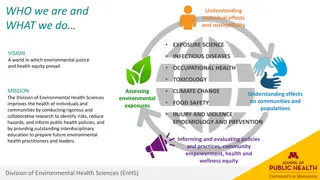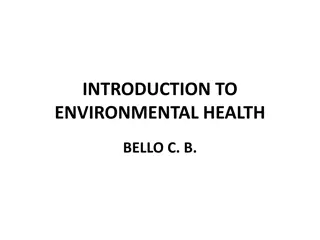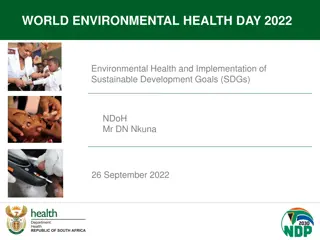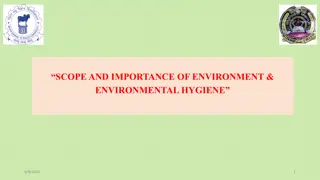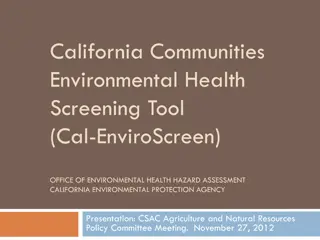Guidelines for Selecting Research Project Topics in Environmental Health
Research is crucial for addressing environmental health issues. Choosing a good research topic is the first step towards effective research. This paper discusses the meaning, characteristics, types of research, and the research process to help in selecting appropriate research topics. Understanding the research process, including problem identification, literature review, hypothesis formulation, data collection, analysis, and reporting, is essential for selecting a research topic successfully.
Download Presentation

Please find below an Image/Link to download the presentation.
The content on the website is provided AS IS for your information and personal use only. It may not be sold, licensed, or shared on other websites without obtaining consent from the author. Download presentation by click this link. If you encounter any issues during the download, it is possible that the publisher has removed the file from their server.
E N D
Presentation Transcript
GUIDELINES/PROCEDURES FOR CHOOSING A GOOD RESEARCH PROJECT TOPIC IN ENVIRONMENTAL HEALTH A PAPER PRESENTED AT A 3 DAY TRAINING WORKSHOP FOR ENVIRONEMNTAL HEALTH TUTORS/OFFICERS IN THE WEST AFRICA SUB-REGION AT PRINCE ALICE HOTELS & HOLIDAY RESORTS LTD., BENIN-CITY FROM 17THTO 21STAPRIL, 2018 BY CHIKWE, CHRISTIAN K. Ph.D Department of Educational Psychology, Guidance and Counselling Ignatius Ajuru University of Education, Rumuolumeni Port Harcourt, Rivers State APRIL, 2018
Introduction Research plays an important role in the lives of individuals, organizations and the society in general. Every now and then, research breaks new grounds which help to bring about development and progress in environmental health. Health related environmental problems are brought to the fore and solutions to such problems are proffered through the instrumentality of research. Effective research activities and efforts begin with choosing good research topics. This paper addresses the guidelines and procedures that will make for choosing good topics. Before looking at guidelines for choosing a good research topic, it will be appropriate to look at the meaning, characteristics, types of research, the research process and other related issues in research. This will help in choosing a good research topic.
Meaning of Research The process of finding solutions to problems through systematic collection, analysis and interpretation of data. systematic application of the scientific method to the study of a problem. Characteristics of Research Research is systematic Research is objective Research is empirical Research is replicable Research has a clear goal Research is cyclical in nature Research is non-ethical Research is a painstaking and expensive activity
Classification/Types of Research Classification based on purpose basic research applied research action research research and development (R&D) evaluation research Classification based on method historical research survey research Correlational research causal comparative or ex-post facto research experimental research
Classification based on whether research is quantitative or qualitative quantitative research qualitative research
The Research Process Problem identification and definition Review of relevant literature Formulation of research questions and hypotheses Design of the study Data collection Interpretation Analysis of data Drawing of inferences/conclusions Writing the report
Ethical Issues in Research Honesty Objectivity Integrity Confidentiality Carefulness by avoiding errors and negligence Responsible publication for the purpose of advancing knowledge and scholarship and not just for promotions
Choosing a Research Topic A research topic is derived from a research problem Importance of Choosing a Good Research Topic It summarises and collapses the main idea of the research problem into researchable statement. It gives focus and direction to the study It determines the success or otherwise of a study It depicts the type of research and design It depicts the purpose of the study
Sources of Research Topics E-Library and other libraries Completed research projects Internet materials Books and encyclopaedia Journal articles
Guidelines for Choosing a Good Research Topic The researcher must identify a problem first before framing the topic to suit it. The topic must fall within the discipline . That is, the topic must fall within environmental health or related to environmental health. It must address important problem in environmental health. The topic should be of interest to the researcher. This will sustain the attention of the researcher throughout the investigation. The researcher should have knowledge on the topic. The topic should be an area where the researcher is competent or area of his expertise. The topic must be informative. The topic should convey sufficient information on the nature of the research problem or study. The topic should not be too lengthy (should be between 12 and 18 words).
The above guidelines are summarized as follows: Relevance: The topic should be relevant to the discipline Avoidance of duplication: Investigate whether the topic has been researched. Feasibility: Consider the complexity of the problem and the resources you will require to carry out the study. Political acceptability: It is advisable to research a topic that has the interest and support of the authorities. This will facilitate the smooth conduct of the research and increases the chance that the results of the study will be implemented. Applicability of possible results and recommendations: Is it likely that the recommendations from the study will be applied? This will depend not only on the blessing of the authorities but also on the availability of resources for implementing the recommendations. Urgency of data needed: How urgently are the results needed for making a decision? Which research should be done first and which can be done later? Ethical acceptability: The possibility that the research may inflict harm on others while carrying out research. Therefore, it will be useful to review the proposed study.
Scales for Rating Research Topics Research topics could be rated using the scale the provided: Relevance 1 = Not relevant 2 = Relevant 3 = very relevant Avoidance of duplication 1 = Sufficient information already available 2 = Some information available but major issues not covered 3 = No sound information available on which to base problem-solving Feasibility 1 = Study not feasible considering available resources 2 = Study feasible considering available resources 3 = Study very feasible considering available resources Political acceptability 1 = Topic not acceptable 2 = Topic somewhat acceptable 3 = Topic fully acceptable
Applicability 1 = No chance of recommendations being implemented 2 = Some chance of recommendations being implemented 3 = Good chance of recommendations being implemented Urgency 1 = Information not urgently needed 2 = Information could be used but a delay of some months would be acceptable 3 = Data very urgently needed for decision-making Ethical acceptability 1 = Major ethical problems 2 = Minor ethical problems 3 = No ethical problems Adapted from: (Getu&Tegbar, 2006)
Conclusion Many researchers have failed to provide tangible solutions to environmental health problems because they lack mastery in the act of choosing project or researchable topics. Again, having the knowledge is not enough but putting it into practice is what makes the difference. As you put the guidelines outlined in this paper into practice, research will become a rewarding experience as you are able to proffer solutions to environmental health issues.





